Apr 8, 2023
By Fr. Dennis Chriszt, C.PP.S.
This is the feast of victory for our God!
Alleluia, alleluia!
Mary Magdalene’s first reaction was panic.
“They have taken the Lord from the tomb,
and we don’t know where they put him.”
She wasn’t sure what to make of an empty tomb
that had once contained the body of her dear friend.
Peter and the other disciple whom Jesus loved
ran to the tomb.
They not only saw that the body was gone,
but that the burial cloths were left behind.
They saw, and we are told, they believed.
This is the feast of victory for our God!
Alleluia, alleluia!
Later, that same morning,
as she wept near the empty tomb,
two angels appeared,
and then Jesus suddenly appears,
but she can’t believe her eyes
and assumes he’s the gardener,
until he calls her by name.
This is the feast of victory for our God!
Alleluia, alleluia!
Later, that same day,
as the disciples huddled together
behind locked doors,
still afraid and uncertain about what to make
of what Peter and the other disciple had seen
at the empty tomb,
he stood in their midst, alive,
and proclaiming, “Peace be with you.”
This is the feast of victory for our God!
Alleluia, alleluia!
Fifty days later,
filled with the Holy Spirit,
no longer afraid and bewildered,
Peter would proclaim,
“This man God raised on the third day
and granted that he be visible,
not to all the people, but to us,
the witnesses chosen by God in advance.”
This is the feast of victory for our God!
Alleluia, alleluia!
In a few minutes,
we will renew our baptismal promises,
proclaiming that we believe “in Jesus Christ…
who… suffered death and was buried,
rose again from the dead
and is seated at the right hand of the Father.”
The grace of baptism will be renewed in us,
so that, like Peter and the other disciples,
we may be “witnesses chosen by God,”
chosen to proclaim that we, too, have seen the Lord.
This is the feast of victory for our God!
Alleluia, alleluia!
We may not have seen him in the same way
that Mary Magdalene, Peter and the other disciples did,
but we have seen the Lord.
We have encountered the Risen One.
We’ve heard him in Good News proclaimed.
We’ve seen him in bread broken and wine poured out.
We’ve encountered him in people
who have offered us friendship, kindness and mercy,
for no particular reason at all.
We’ve seen him in people who’ve suffered
and moved our hearts to compassion.
We’ve seen him when a stranger reached out to us
in our hour of need.
We’ve seen the Risen Lord
in people whose words and deeds have inspired us
and opened our hearts in new ways.
This is the feast of victory for our God!
Alleluia, alleluia!
And we come here,
week after week,
year after year,
not just to remember
what happened on that first Easter Day,
like Mary Magdalene, Peter and the disciple whom Jesus loved,
we come here searching for the one who died.
But unlike Mary Magdalene, Peter and the disciple whom Jesus loved,
we come here because we know he is risen.
We know why the tomb is empty.
We know that, though he is seated at the right hand of the Father,
he still walks among us,
still heals broken hearts,
and still promises us resurrection, too.
We come here
because we believe in the one who once said,
“I am the resurrection and the life,
whoever believes in me, even if he dies, will.”
This is the feast of victory for our God!
Alleluia, alleluia!
To view the full scripture reading, click here.

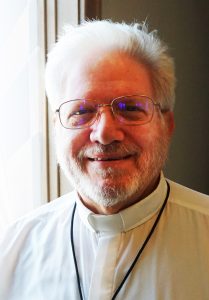
Fr. Dennis Chriszt, C.PP.S., is the director of advanced formation for the Missionaries of the Precious Blood. He also directs Precious Blood Parish Missions (pbparishmissions.org).
Apr 1, 2023
By Fr. Tim Knepper, C.PP.S.
The Gospel for Palm Sunday might be one of the longest readings we get in a year, not counting the Easter Vigil marathon. Long readings or intense theological ideas are good at times, but in a setting like Alcoholics Anonymous, even the Big Book gets broken down into focusing just on one or two pages at a time.
Short phrases or lines from writers land pretty well too. One from Regina Brett, a columnist, author, grandmother, and now podcaster, sticks out with hearing about the crowds today in the Gospel: “What other people think of you is none of your business.” Brett’s grandkids might adapt it in this age of technology: don’t read the comments.
In the Passion story for this Palm Sunday, the crowds surround Jesus at opposite ends. At the beginning of Mass, we hear the crowds shouting, “Hosanna in the highest!” Then at the reading of the Passion, we hear the crowds turn on Jesus, shouting, “Crucify Him! Crucify Him!”
At his entrance to Jerusalem, Jesus accepts the praise offered by the people, but it isn’t the praise of the people that brings him to Jerusalem. It isn’t what they think of him that drives him throughout his Passion. Before the praises of the crowd, Jesus reminded the crowd and reminds us: blessed are the poor, blessed are the peacemakers, blessed are you when you welcome the stranger in your midst. Blessing isn’t based on whether the crowds love him or shout for his execution. Blessing is based on what God says of us, not what the crowds say—either in praise or in condemnation.
It’s not our business what other people think of us, and at the same time, we’re not completely on our own. In our religious community, our families, our local communities, our Church, and our whole world, we are connected to one another.
Our founder, St. Gaspar, had a vision of the bond of charity connecting us within the Precious Blood community, reminding us that we aren’t islands by ourselves. The connection and community of being together leads us to support and enrich each other.
Jesus doesn’t journey through the Passion alone. Different people, from Simon the Cyrean, the women of Jerusalem, and the beloved disciple, stay with Jesus in his Passion. The connection or communion God calls us to share with one another is closer to this kind of support throughout Jesus’s Passion than it is the crowd praising and then condemning Jesus.
As we enter into this Holy Week, may we find strength in this communion with one another. May we remember we don’t make this journey alone, even in the moments when suffering or pain in our lives feels like we’re all alone.
It’s not the crowds or the opinions of other people that support us throughout our journey this Holy Week. It’s our real connection with each other and the communion God builds in us that strengthen us in the journey to the cross and to the empty tomb.

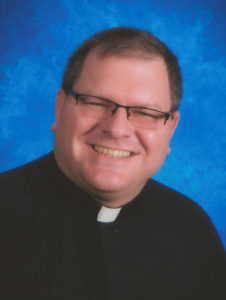
Fr. Tim Knepper, C.PP.S., is the parochial vicar of St. Joseph Catholic Church, Palm Bay, Fla. He is also a spiritual director.
Mar 31, 2023
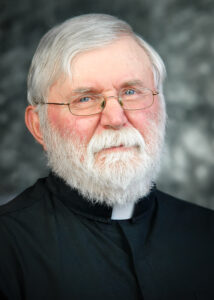
Brother Paul Chase, C.PP.S.
December 9, 1945–March 30, 2023
Brother Paul Chase, C.PP.S., 77, died in the infirmary at St. Charles Center, Carthagena, Ohio, on Thursday, March 30, 2023. He had been in failing health for several months, after a fall.
He was born December 9, 1945, in Fairbank, Iowa, to Frank and Amber (Deaton) Chase. He entered the Congregation at Saint Joseph’s College in Rensselaer, Ind., in 1965 and was professed on August 15, 1966.
Brother Paul spent his life as a religious brother in ministry at St. Charles Center in Carthagena, Ohio, where he worked as a farmer and dairy herdsman in his earlier years, and also raised chickens and other poultry, including several specialty breeds. Brother Paul also cared for the peacocks who preened near St. Charles’ lakes.
Brother Paul is survived by his sister Carol (Gary) Nuss, Oelwein, Iowa; two brothers, David (Pat), Fairbank; and Tracy, Independence, Iowa; a sister-in-law, Judy Chase, Fairbank; several nieces and nephews, great-nieces and great-nephews; and the Staugler family, his second family during his years at St. Charles.
He was preceded in death by his parents; and two brothers, Earl and Lyle.
Brother Paul was a familiar figure around St. Charles. His daily routine included caring for his chickens in the barn behind the main building. He sold eggs to St. Charles’ neighbors and others who traveled for miles to get them. Brother Paul raised special varieties of chickens and turkeys for people who exhibit them at poultry shows, for 4-H members to take poultry projects to the fair (he was a 4-H member himself, as a boy), and for backyard enthusiasts who want to populate their own chicken coops.
In the afternoons, Brother Paul would patrol the grounds, picking up trash, sticks and other debris, his faithful cat named Dog running alongside the motorized cart he had to use in later years.
Brother Paul knew poultry people across the United States, and they come to him to buy birds, for advice or just to talk birds. With the help of his friend, Tom Staugler, he brought birds to auctions and sales.
He loved his life on the farm at St. Charles; he joined the Congregation in part because “they had cows,” he once said. (St. Charles was famous for its Brown Swiss dairy herd in those years.) He saw livestock and his poultry flocks as part of God’s creation, worthy of the best care he could give them. He never stopped learning about them, studying their ways.
A Mass of Christian Burial will be held in Assumption Chapel at St. Charles Center on Tuesday, April 4 at 2 p.m., with Fr. Jeffrey Kirch, C.PP.S., provincial director, presiding. Fr. Matthew Keller, C.PP.S., will be the homilist. Burial will follow in the Community Cemetery.
Viewing will be held in the parlor at St. Charles on Tuesday from 11 a.m. until Mass.
Memorial donations may be made to the Missionaries of the Precious Blood, United States Province.
May he rest in peace.
Mar 25, 2023
By Deacon Turf D. Martin
Surprise! Many of us have been to a surprise birthday party or surprise anniversary celebration. There is a surprise party going on right now and we are invited. The surprise is to look on life with the eyes of faith, to see exactly what we see now but to see it in a different way.
The raising of Lazarus is a revelation, a sign, a pledge of the power Jesus has over death.
We see that many times in the Gospel of John people understand Jesus’ words in a human way but Jesus wants to raise people’s thinking and understanding to a new higher way of looking at life. His words surprise people, because he is asking them to see him in a new way, divine rather than human.
In today’s Gospel, St. John chooses to convey this life-giving doctrine, this wonderful Good News of salvation, by means of a drama. The focus of the drama is not so much on Lazarus, as on the relationship Jesus has with his two sisters, Martha and Mary. We know these women already from St. Luke’s Gospel: Martha typically active; Mary apparently passive, yet the one whose love of Jesus is deeper, and who follows him more closely.
Jesus loves them both, as he loves Lazarus. Yet, remarkably, Jesus deliberately allows Lazarus to die. He could have saved him. The sisters know that. Why did he not act? How could he allow Lazarus to die, and them to suffer such sorrow and loss?
Jesus says to Martha, “Your brother will rise.”
Martha professes her faith in the resurrection at the last day, “I know he will rise, in the resurrection on the last day.”
But Jesus wants to take her to a new understanding of resurrection, “I am the resurrection and the life; whoever believes in me, even if he dies, will live, and everyone who lives and believes in me will never die. Do you believe this?”
Jesus wants Martha to know that it is through Jesus himself that Lazarus will rise again. Jesus is the resurrection. Jesus also wants Martha and us to know that for anyone who believes in Jesus, death has only the appearance of death because we live after death, “whoever believes in me, even if he dies, will live.”
When we live as Jesus calls us, there is a continuation from this life to the next. The resurrection is not just something in the future—Jesus offers life now. The new life in the resurrection is for now. To prove his words to Martha, Jesus raised Lazarus.
Don’t miss out on the offer of Jesus’ life to you now. Don’t waste life. Live life with Jesus! Live the life of Jesus now so that you will not die. Allow Jesus to raise us up to new life. The resurrection is not just something in the future, Jesus offers life now. The new life in the resurrection is for now.
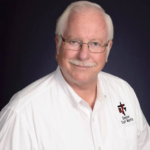
Ordained in 2013 in the Diocese of Jefferson City, Mo., Deacon Turf Martin ministers at St. Vincent de Paul Parish in Sedalia, Mo., which Missionaries of the Precious Blood founded and where they previously served. Deacon Turf and his wife, JoAnn, are Precious Blood Companions.
Mar 4, 2023
By Fr. Jeffrey Kirch, C.PP.S.
Now that we are well on our way in the season of Lent, I am sure each of us has made some Lenten resolutions. Maybe you gave up chocolate or social media. Maybe you promised to watch less television and to pray more. And I’m sure that now after a week of Lent each of us have been tempted to have that chocolate or watch the extra hour of television.
We know we ought to keep our resolutions. We know it’s the right thing to do. But we also know it is hard! It is hard to change our habits. If we just had a little extra will power, then we would be successful. Walk into any bookstore and you’ll see shelves of self-help books that offer us hundreds of strategies for improving our lives. And for most of us, those books are not very helpful. No matter how hard we try, we often fail after a few weeks. No matter how great the self-help strategy is, we falter.
Our readings for the second Sunday of Lent offer us an alternative to self-help books. Instead of self-help, our readings point to the importance of community and covenant. In the first reading from Genesis, Abram entered into covenant with God. Abram did not seek of his own accord and effort to make himself great. He did not try to build a great nation through his own work. Instead, he entered into covenant and God blessed Abram. Abram didn’t go it his own. He stayed connected to God and was blessed.
In the Gospel reading we have the story of the Transfiguration. Jesus takes Peter, James and John up the mountain, and together they witness something that is unbelievable. Together they see Jesus become dazzling white and they see Moses and Elijah with him. Together they are in awe and are frankly befuddled. Then they hear the voice of God and fear overwhelms them. It took a simple touch from Jesus to rescue them from their fear.
This episode highlights the importance of being in community, in communion, with one another and with Jesus. Peter, James and John did not have individual experiences of the transfiguration. Instead, they witnessed these events together as a community. And when they were frightened and scared, they did not try to go it alone and figure out what was happening. Instead, through their connection with Jesus they were able to overcome the fear.
Communion and covenant are important elements of our Precious Blood spirituality. We believe that the Precious Blood of Christ has made us one. And we have been bound to God by a bond that can never be broken. During this time of Lent, instead of turning to the self-help section of a bookstore, let us turn to one another for help and support. Let us realize that Christ, is reaching out to touch us and to tell us to not be afraid for Christ is with us.

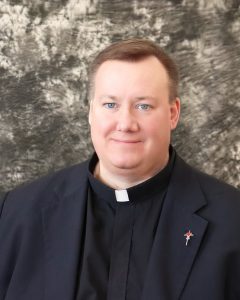
The V. Rev. Jeffrey Kirch, C.PP.S., is the provincial director of the United States Province. Previously, he served as the secretary general of the worldwide Congregation and was also in ministry at Saint Joseph’s College in Rensselaer, Ind., of which he is an alumnus.
Feb 25, 2023
By Fr. Joe Uecker, C.PP.S.
While Lent is a time to consider our sinfulness, it is also a time to ponder the graciousness of God. The Responsorial Psalm for the First Sunday of Lent sets the tone for the entire season. It is one of the most familiar biblical prayers for divine mercy:
Have mercy on me, O God, in your goodness;
In the greatness of your compassion wipe out my offense.
If this psalm is the prayer of the sinner, the first reading for today is the story of the sin. Like every biblical story of sin, it begins with the graciousness of God. It is important that we recognize this order, lest we think that sin is simply the transgression of law, rather than a breach of a loving relationship.
he passage describes how God created the first human person just as a potter forms a piece of art and breathed into his nostrils the breath of life. He then became a living being.
But life itself was not enough. God provided this human person with the nourishment and beauty of the natural world. And why did God so act? Because God is gracious.
Not satisfied to be a humble earth-creature, the man and his new female companion desire to “be like gods who know what is good and what is evil.” This is the universal and perennial sin, to want to “be like gods.” And who has not ‘fallen’ into that same trap? Humankind seems prone to sin. We set ourselves up as a law unto ourselves; we seek to control others; we reject God and enthrone human ingenuity.
Have mercy on me, O God.
Lent is a time to acknowledge our sinfulness, but not to dwell on it. We must acknowledge it if we are to appreciate the extent of God’s goodness. This is precisely what Paul teaches us today. The sinfulness of humankind cannot be denied, but as grievous as the sin may be, How much more did the grace of God and the gracious gift of the one man, Jesus Christ, overflow for the many.
Paul contrasts Adam and the evil of human sin with Christ and the grace that comes because of divine mercy. According to Paul, there is no comparison, grace far surpasses sin: In the greatness of your compassion wipe out my offense.
The Gospel reading shows us human nature at its finest. Jesus is tempted, yet he does not succumb. Many scholars believe that this account reflects more than simple temptation. Rather, it draws its meaning from past events in the history of ancient Israel and it focuses on the messianic ministry of Jesus.
And what were the temptations that Jesus faced? He successfully resisted temptations like those to which the ancient Israelites fell victim: grumbling against God because of hunger in the wilderness; demand for a demonstration of divine power; worship of a false god. His ancestors may have failed, but Jesus remained faithful.
Many commentators maintain that this narrative reveals the true character of Jesus’ messiahship. It shows that Jesus sought to satisfy spiritual, not merely physical, hunger; he refrained from using divine power simply to attract followers; and he was submissive to God’s will, not his own.
We enter Lent this year sobered by world events. The horrors and inhumanity of war and assaults on truth have embittered our spirits; the devastation of natural catastrophes has seared our hearts. We have been forced to face our own human failings and the vulnerability of humankind generally. Despite all of this, the graciousness of God is offered to us. The unselfishness of which we are all capable is seen in the willingness of so many to step forward and help others who suffer terror, loss and confusion.
This unselfishness is really the face of our gracious God, encouraging all of us to put differences aside, to repent of our offensive attitudes, and to work for a caring and harmonious world.
Jesus’ resistance to temptation is placed before us today as an example for us to strengthen our own resistance to temptation. He would have us move beyond a superficial pursuit of the pleasures of this world to discover what satisfies our spiritual hungers. He shows us how to trust in God’s tender providence rather than merely test God’s almighty power. He challenges us to worship God rather than power, possessions, or celebrity. What will be our response?
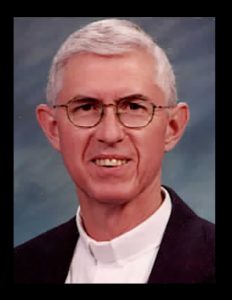
A native of Fort Wayne, Ind., Fr. Joe Uecker, C.PP.S., has spent over 40 years in ministry in the Diocese of San Angelo, Tex. He served as pastor in San Angelo, Sweetwater, Abilene and Odessa. Since retiring in 2011, he continues to live in Odessa.






